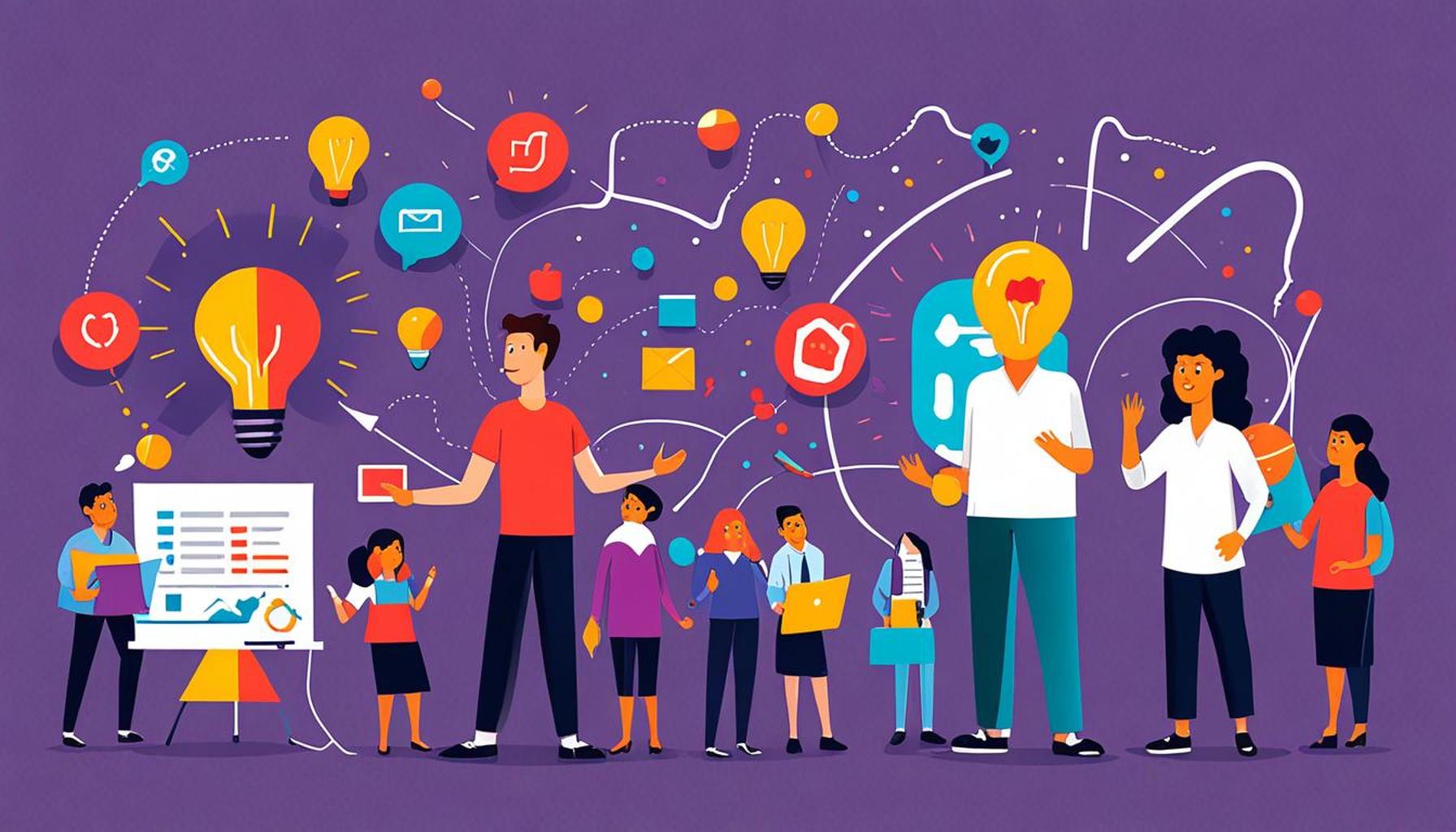How to Use Feedback to Develop Leadership Skills in Young Professionals

Harnessing the Power of Feedback
Effective leadership transcends natural talent; it fundamentally hinges on the capacity to evolve and adapt in response to diverse inputs. In an ever-accelerating professional landscape, particularly in Nigeria, where industries are shifting rapidly, brushing off feedback can be a costly mistake. By embracing feedback as a crucial component of personal and professional development, aspiring leaders can unlock profound insights that lead them toward leadership excellence.
Why Feedback Matters
For any young professional keen on leadership roles, understanding the significance of feedback is essential. Here are several reasons that highlight its importance:
- Self-awareness: Feedback is a mirror reflecting one’s strengths and weaknesses. For example, after delivering a presentation, soliciting input from peers can reveal unnoticed strengths in communication or stress areas needing improvement.
- Continuous learning: Feedback nurtures an atmosphere of growth by inviting constructive criticism. In Nigeria’s diverse work environments, managers who regularly seek feedback from their teams demonstrate a commitment to collective improvement and learning.
- Team synergy: Actively embracing feedback creates an environment where collaboration thrives. Teams that regularly exchange constructive input often experience improved morale, ultimately leading to enhanced productivity.
In regions like Lagos or Abuja, where corporate dynamics fluctuate due to economic growth and digital transformation, the demand for adept leaders has never been higher. Young professionals who cultivate the habit of seeking feedback inherently foster a culture brimming with openness and innovation.
Transforming Feedback into Action
Receiving feedback is merely the first step; the true test lies in how one acts upon it. To channel feedback into effective leadership growth, individuals should focus on three core actions:
- Reflect: Engage in thoughtful consideration of the feedback received. This means dedicating time to understand the core message behind the suggestions and recognizing emotional reactions attached to it.
- Act: Implement constructive changes based on the feedback. For instance, if a colleague mentions a need for clearer communication, adjusting one’s presentation style to include more engaging visuals can help fulfill that requirement.
- Follow up: Reconnecting with peers to discuss progress after implementing changes creates accountability and encourages a continuous feedback loop, crucial for sustained improvement.
By skillfully utilizing feedback, young professionals not only enhance their leadership capabilities but also solidify their contributions to their teams and organizations. This proactive approach inherently promotes a culture of mutual respect and collaboration, vital for success in Nigeria’s dynamic corporate landscape. Such empowered leaders are better positioned to tackle challenges, inspire innovation, and drive their organizations forward.
LEARN MORE: This related article may interest you
Embracing Feedback for Leadership Growth
The journey of a young professional aspiring to become a leader is often fraught with challenges and opportunities. In this quest, feedback serves as an invaluable tool for fostering essential leadership skills. The ability to receive, interpret, and act on feedback not only aids personal development but also enhances one’s capacity to lead effectively. Understanding how to turn feedback into actionable insights is a critical step in this process.
Understanding Different Types of Feedback
Feedback can come in several forms, each with its distinct value. Here are the primary types that young professionals should be aware of:
- Formal Feedback: Typically delivered in performance reviews, these assessments offer structured insights into an individual’s strengths and areas for improvement. Engaging with this feedback proactively allows young professionals to map out their career trajectories.
- Informal Feedback: Often shared in casual conversations or during team meetings, informal feedback can provide immediate insights. Recognizing the importance of these off-the-cuff comments from peers can greatly influence behavioral adjustments and foster a more cohesive team dynamic.
- Peer Feedback: Colleagues who work closely with an individual may have a unique perspective on their behavior and performance. Seeking out peer reviews encourages openness and collaboration, leading to richer insights that are invaluable to leadership development.
In Nigeria, where innovation and adaptability are vital for success, harnessing various feedback channels can empower young professionals significantly. For example, a budding manager in the burgeoning tech industry may solicit feedback from team members after implementing new software. This approach not only showcases a commitment to improvement but also strengthens relationships among the team.
Creating a Feedback-Friendly Environment
The atmosphere in which feedback is exchanged plays a crucial role in its efficacy. It’s essential for young professionals to cultivate a feedback-friendly culture within their workplaces. Here are some strategies to consider:
- Encourage Open Dialogue: Leaders should foster an environment where team members feel comfortable voicing their insights. This can be achieved through regular check-ins or team-building activities that emphasize trust and transparency.
- Model Receptiveness: Young professionals should openly accept feedback, demonstrating vulnerability and a willingness to grow. When leaders exhibit a positive attitude towards feedback, team members are more likely to engage in the process.
- Use structured feedback tools: Platforms such as surveys or appraisal forms can help standardize feedback collection, ensuring that it is constructive and actionable. Utilizing technology to gather and analyze feedback presents a modern approach to leadership development.
Empowering young professionals to actively seek and utilize feedback sets the stage for not only personal success but also broader organizational growth. As they learn to embrace diverse viewpoints and experiences, they cultivate the adaptability that is essential for navigating the complexities of Nigeria’s evolving business landscape.
| Advantage | Description |
|---|---|
| Enhanced Self-Awareness | Feedback helps young professionals understand their strengths and weaknesses, which is crucial for personal development. |
| Improved Communication Skills | Regular feedback encourages open dialogue and helps professionals express their ideas more clearly and effectively. |
Incorporating feedback into one’s professional journey can truly unlock potential in a young leader. The first advantage highlighted is enhanced self-awareness. When young professionals receive feedback, they gain insight into their own behaviors and skills, allowing them to identify areas to improve and leverage their natural strengths. This growth in self-awareness is not merely introspective; it is often the first step in a longer journey towards effective leadership, as leaders who understand themselves are better equipped to lead others.Furthermore, the second advantage is the development of improved communication skills. In modern workplaces, the ability to communicate clearly and engage teams effectively is paramount. Feedback provides an environment where young professionals can practice these skills, learning to articulate their thoughts and respond constructively to criticism. This ongoing engagement not only enhances their individual capabilities but also fosters a culture of transparency and collaboration within their teams. As such, learning to accept and give feedback becomes a foundational skill that prepares them for future roles in leadership.
RECOMMENDED: Check out this similar article
Transforming Feedback into Actionable Leadership Development
Receiving feedback is just the first step; the real magic happens when young professionals actively transform that feedback into action. In order to develop leadership skills effectively, aspiring leaders must not only process the insights they receive but also implement them in a way that aligns with their personal growth aspirations and organizational goals. Here are some key strategies to facilitate this transformation.
Setting Specific Goals Based on Feedback
One of the most effective strategies is to develop SMART goals—specific, measurable, achievable, relevant, and time-bound—based on the feedback received. For instance, if a young professional learns that their presentation skills need improvement, they could set a goal to attend a public speaking workshop within the next month and practice presenting at least once a week. By tying feedback directly to actionable objectives, individuals not only enhance their skill set but also create a clear roadmap for their leadership journey.
Incorporating Feedback into Daily Practices
Integrating feedback into daily behaviors is essential for continuous improvement. Young professionals should seek to document feedback and review it regularly, using tools like journals or digital apps to track their progress. An example might be noting constructive criticism about team collaboration, then consciously applying different communication techniques in subsequent meetings. This iterative process helps ingraining new leadership habits that can significantly enhance team dynamics and drive project success.
Participating in Mentorship Programs
Another powerful way to leverage feedback is through mentorship. Engaging a mentor allows young professionals to gain deeper insight into their feedback from a seasoned perspective. Mentors can help contextualize feedback, provide additional resources, and share their own experiences in overcoming similar challenges. For instance, a mentor in Nigeria’s fast-growing fintech sector can offer invaluable advice on navigating the unique challenges of that industry while utilizing feedback for improvement.
Creating a Personal Development Plan
A Personal Development Plan (PDP) serves as a guide for integrating feedback into long-term leadership development. This comprehensive plan should outline identified areas for improvement based on feedback, set specific learning outcomes, and include timelines. Regular review of the PDP will motivate young professionals to stay committed to their growth. For example, if a budding manager realizes they struggle with conflict resolution, their PDP could involve workshops on negotiation tactics and practical exercises in conflict management scenarios within their team.
Encouraging Peer Reflection
Feedback is not merely a top-down process; it encourages peer reflection to foster teamwork and shared growth. Young professionals can suggest regular peer sessions where colleagues exchange feedback on specific projects or performances. This practice not only strengthens working relationships but also cultivates a culture of openness and continual learning. For instance, in a local agriculture startup, team members could share insights after each project cycle, leading to innovative solutions reflective of collective wisdom.
As young professionals in Nigeria strive to become effective leaders, the combination of setting targeted goals, participating in mentorship, and fostering collaborative feedback loops creates a robust framework for leadership development. Tapping into these feedback channels opens doors to new opportunities and enhances their ability to adapt to the complex work landscapes that define Nigeria’s economic narrative.
YOU MAY ALSO LIKE: Read read another article
Conclusion: Embracing Feedback for Effective Leadership Development
A comprehensive approach to using feedback is essential for young professionals eager to cultivate their leadership skills. The journey begins with actively seeking, receiving, and thoughtfully processing feedback, transforming it into a crucial tool for personal and professional growth. By establishing SMART goals, documenting their progress, and integrating feedback into daily practices, these individuals create a solid foundation for ongoing improvement. Moreover, mentorship offers invaluable insights and context, empowering young leaders to navigate challenges more effectively.
As young professionals in Nigeria engage in creating Personal Development Plans and participating in peer reflection sessions, they foster an environment of mutual support and learning. This collaborative culture not only works to enhance individual skills but also contributes to a more adaptable and innovative workforce, essential for thriving in the evolving Nigerian economy.
Ultimately, the ability to embrace and utilize feedback defines the potential for young professionals to emerge as impactful leaders. It is through this continuous cycle of receiving, implementing, and reflecting on feedback that they can hone their skills, drive meaningful change, and shape the future of leadership in various sectors. As the business landscape in Nigeria becomes increasingly complex, those who harness feedback for growth will undoubtedly position themselves as trailblazers committed to excellence and resilience in leadership.



